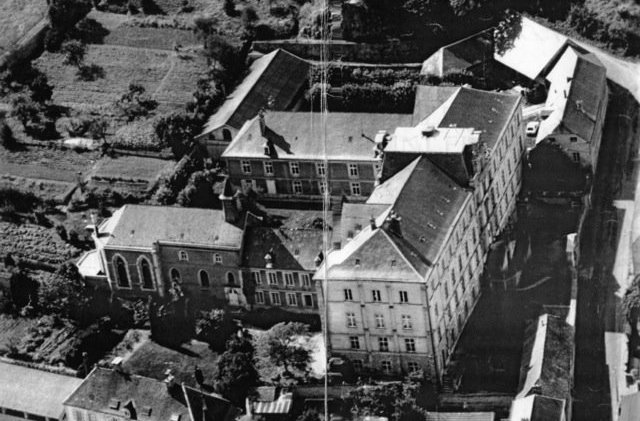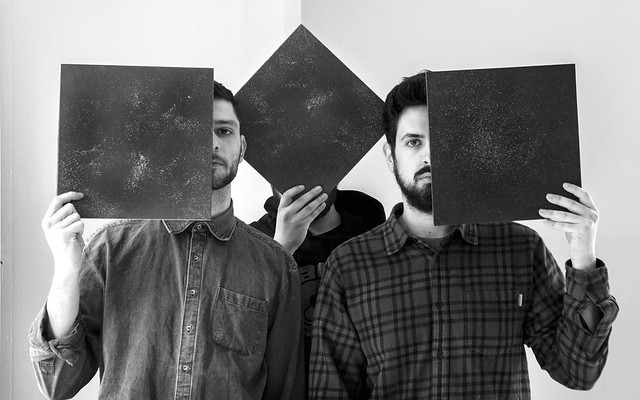Empty Vessels Make Most Noise // paf, Ripatti, and pisspots

I am writing this on the Eurostar back from paf (performing arts forum), a squatlike mansion in France’s Champagne region. paf’s primary function is to enable artists, musicians, and writers to do what they will: fuck around, sketch, waste time. Everyone there is up to the same thing, pretending to work on realising artistic projects. I was there with Laurel Uziell, attempting to finish the Egg Meat album. We failed.
There is more than a little of the Overlook Hotel there. I am told the building once housed Nazis and cults. There is the feeling that paf’s past residents haunt the corridors. At one point, I am sure someone thinks I am a ghost. Noodling on a grand piano in a moonlit ballroom, I watch someone enter the room, see my silhouette, do a 180° out the room and slam the door. On hearing this, a comedy writer tells me that “every ghost story has another side to it”.
The grand piano is not the only luxury within the walls of paf. There is also a sauna, a wine cellar, a cinema, a chapel with a harmonium, a pharmacy, a music studio, a smoking room, two libraries, even a cave with a DJ booth. With so many distractions, I don’t know how much art, especially good art, is actually made there. One evening some artists are planning a performance for the cats and chickens. Someone else says that they are planning to do a ‘performance for nappies’ later in the week. Nonetheless, it’s a beautiful space to think. So I too relished the opportunity to indulge in some mental masturbation. Maybe they should call it fap.
The obligations in return for use of paf are a small fee, some cooking, some cleaning, don’t be a dick, and leave no trace. In a small way, this is how I have always imagined the boring day-to-day necessities of communal living. Through small luxuries and mutual aid, from each according to his ability, to each according to his needs. I am more than happy to clean toilets once a week in exchange for the daily use of a fully equipped music studio. I am reminded of Francis Wheen’s biography of Marx, in which he writes that,
“…when a German smart aleck tried to catch him out by wondering aloud who would polish the shoes under communism, Marx replied crossly, “You should.””
On this journey back I am listening to Vladislav Delay’s Visa, which just celebrated its 10th birthday. At the time of release, Ripatti described the experience of writing the album during a two week period of intense creative inspiration. “A valve broke free”, he wrote, “and I collected what came out the pipes”. What came out the pipes was an avant-garde masterpiece.The ‘break’ Ripatti speaks of happened at the start of a planned US tour, during which he was turned away at the border for insufficient Visa documentation. With the shows cancelled, he had a fortnight of Nothing to confront. He returned home, and filled the void with music.
Visa is thus a music unconstrained. The opening track lasts over 20 minutes, but begins with breakneck key changes and textural left turns. Tape-saturated samples clatter forward like a typewriter stuck on a single character. One gets the feeling that these sounds are epiphenomenal. The machines hum and purr as if without direction, organic emergences from analog circuits. Who said androids don’t dream of electric sheep? Yet Ripatti’s hand is never far away. There are hallmarks of his auteurism everywhere, like the pregnant 9th chords that also open his earlier record, Entain.
Instrumental music can be hard to narrativise. But the track titles follow a (mostly Finnish) orthographic logic that tell the tale, even without the biographic context:
Visaton – a company that specialises in loudspeakers and audio systems
Viaton – “Innocent”
Viisari – “Hand" (as in the hand of a clock, like the hour hand or minute hand)
Vihollinen – “Enemy”
Viimeinen – "Last" or “Final"
Ripatti wrote Visa not in the absence of obstructions, but through the will to transcend them. And we find that what runs through these titles is that morpheme of power and life: vi. The syllable that gives vitality, vigour, vida and vita, vividness, vivacity, and virtue. In a word, everything that a border cannot.
Both paf and Visa show how emptiness can hold potential for resonance. paf’s empty ballroom held the potential for a ghost story. Ripatti’s empty fortnight held the potential for Visa. Emptiness is the prime condition for resonance. And in music, resonance is everything.
In the Sirens episode of Ulysses, Bloom hears music in the Ormond Hotel and remembers the sound of Molly urinating into an empty chamber pot:
“…Chamber music. Could make a kind of pun on that. It is a kind of music I often thought when she. Acoustics that is. Tinkling. Empty vessels make most noise. Because the acoustics, the resonance changes according as the weight of the water is equal to the law of falling water. Like those rhapsodies of Liszt’s, Hungarian, gipsyeyed. Pearls. Drops. Rain. Diddleiddle addleaddle ooddleooddle. Hissss…”
Chamber music has a special significance as it was also the title of Joyce’s first book-length publication, a collection of 36 short lyric poems. His brother Stanislaus suggested the title, after noting the relationship between Joyce’s moody, precise poetry and the refined elegance of Renaissance court music. The title gained the scatalogical pun after a chance incident in which Joyce read the new collection to a widow. Richard Ellmann recounts the story:
“Gogarty, who was then in Dublin, had brought Joyce to visit Jenny, an easy-going widow, and while they all drank porter Joyce read out his poems, which he carried with him in a large packet, each written in his best hand in the middle of a large piece of parchment. The widow was pleased enough by this entertainment, but had to interrupt to withdraw behind a screen to a chamber pot. As the two young men listened, Gogarty cried out, 'There's a critic for you!' Joyce had already accepted the title of Chamber Music which Stanislaus had suggested; and when Stanislaus heard the story from him, he remarked, 'You can take it as a favorable omen’".
The chamber pot also makes an appearance in Ulysses’ celebrated final chapter, Molly’s soliloquy. Near the end of her 6th sentence, Molly’s period starts (geddit?) and she listens to it “pouring out of me like the sea”. Sitting on her bloody chamber pot, she thinks “O Jamesy let me up out of this pooh”, a meta-referential call to her creator. She ends the passage with a half-remembered poem by Robert Southey: "O how the waters come down at Lahore”.
For Joyce, Jenny’s trivial tinkling found its way into a pun on Baroque music. For Bloom, Molly’s tinkling elevates to the status of Liszt's rhapsodies. Through these transmogrifications, the chamber pot becomes a body that sings. Its emptiness amplifies its resonance. An object vacant of meaning finds resonant promises pulsing with life.
I waas asked to write on whatever I desire most when I think of a "liberatory future". But I am nearly back in London. So I guess I failed again. All I want for this year is to dance with ghosts, break the valves that confine us, strike the empty vessels until they resonate, and for the pisspots of our lives to overflow with what we make of them.
HAPPY NEW YEAR!
- Published
- Jan 7, 2025
- Credits
- Words by Georgie McVicar
